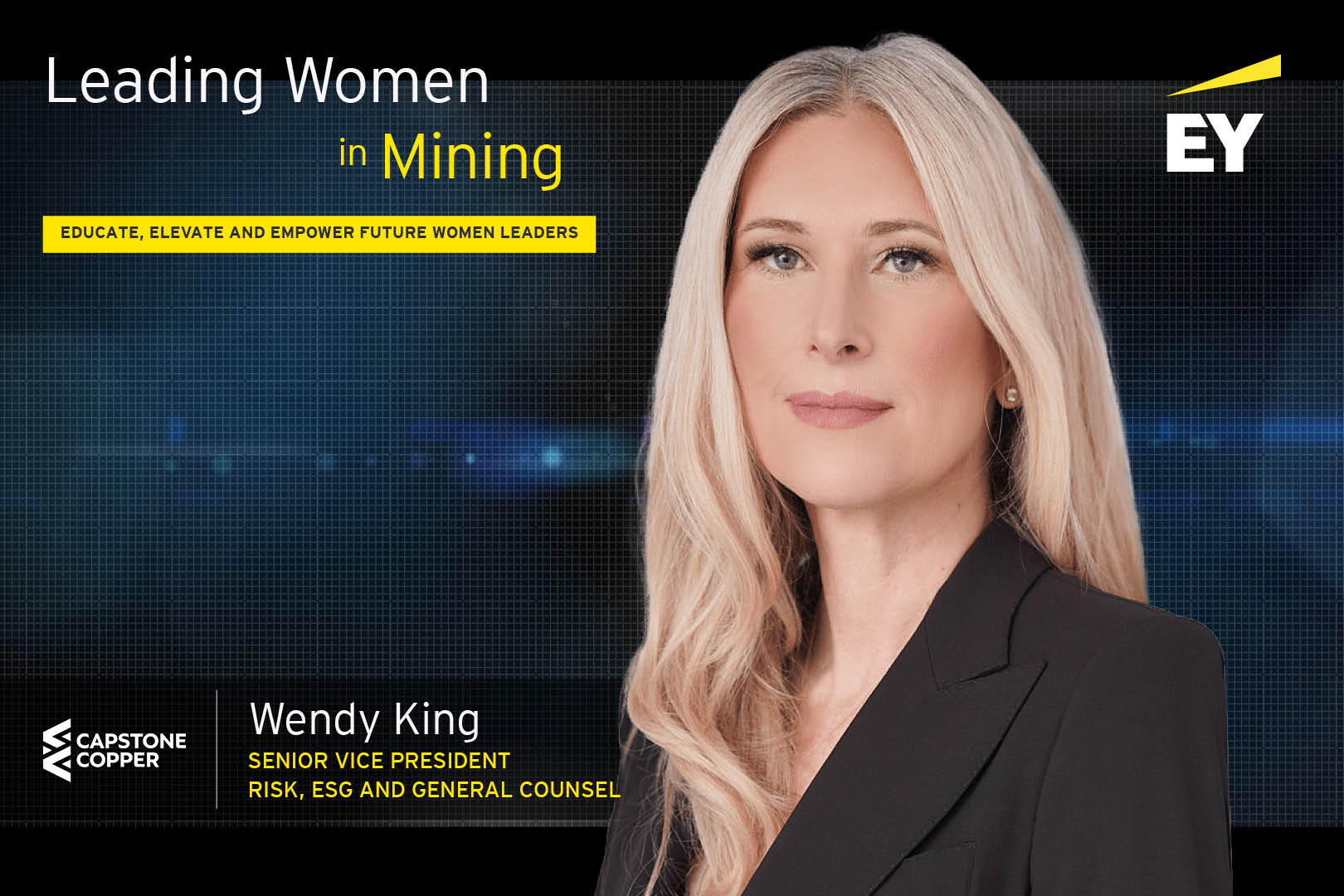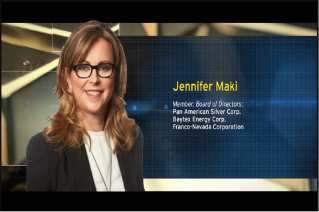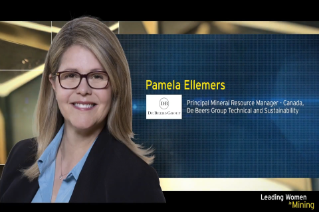EY refers to the global organization, and may refer to one or more, of the member firms of Ernst & Young Global Limited, each of which is a separate legal entity. Ernst & Young Global Limited, a UK company limited by guarantee, does not provide services to clients.

Watch Kelly Stark-Anderson, Executive Vice-President, Corporate Affairs & General Counsel, Dundee Precious Metals Inc discuss key success factors from sport that helped her carve out a successful career to opportunities that will create pathways for women in mining.
Leading Women in Mining is a video series showcasing female role models in the sector who, by sharing their career journeys and lessons learned, are aiming to inspire and advance tomorrow’s women leaders in mining.
Kelly Stark-Anderson, Executive Vice-President, Corporate Affairs & General Counsel, Dundee Precious Metals Inc
Theresa Sapara: Welcome to this episode of Leading Women in Mining. My name is Theresa Sapara. I'm with EY’s Mining and Metals Center of Excellence, and it's my great pleasure to welcome Kelly Stark-Anderson to our episode today. Kelly, thank you very much for joining me. Looking forward to this conversation.
Kelly Stark-Anderson: Thank you very much. I am as well.
Theresa Sapara: Kelly, you've had a very accomplished career. Currently, you are the Executive Vice President of Corporate Affairs and General Counsel at Dundee Precious Metals. But I also know that part of your journey to where you are today has been really influenced by sport. You're very involved in Canada's aquatic sporting program, and so it got me thinking: how has sport really influenced your career? Maybe some of the key success factors that you've seen from sport that helped you navigate your professional career in mining?
Kelly Stark-Anderson: Well, that's a very interesting question and one I could probably speak about for hours on end. But, you know, my experience in the aquatic sports and particularly in diving, three-meter and ten-meter diving, not scuba diving, is all about not my personal experience as an athlete. But as part of the governance structure of Canadian diving and the aquatics. It’s all about high performance and high performance with discipline, drive, motivation, measuring performance, being exact about what you're trying to do and how you're going to get there and determining a strategic path. And I had the great fortune to work with a number of very innovative individuals, creating a strong program to create success for Canadian athletes on the podium in numerous events in the Olympics, World Championships, Pan American Games. And I brought that experience and that thinking into the way I manage my career and my approach.
Theresa Sapara: It's really interesting. I think that's something that makes you stand out and unique to the industry. And so maybe thinking just beyond sport and looking at the lessons learned that you've had within this industry, what are some of those most valuable lessons learned that you think have helped catapult or helped achieve the successes that you've had thus far?
Kelly Stark-Anderson: Well, I started my career as a young lawyer a couple of blocks away on Bay Street. And for me it was always about being authentic. There are expectations for women in industry, and especially too many decades ago than I would like to count, of how you should behave, how you should fit in, what you should do, how you should think, how you should express yourself.
None of it really sat very well with me. I never really kind of got in the groove of like pretend to be like the guys, be a man, you know, wear the suit with the floppy bow, that’s sort of like a tie. I always just wanted to be myself and express my own thoughts, my own thinking, make decisions for myself authentically.
Some of that was just by trial and error. And then as I progressed in my career, it was very thoughtful and deliberate because it was successful for me.
Theresa Sapara: Yeah, that's some great lessons learned in terms of authenticity. So, thank you very much for sharing. And I think it's a really interesting segue to talk about actually what the mining sector itself is doing in terms of growing its pipeline of talent, especially bringing in a greater representation of females. So, I'm wondering and curious to hear what is your perspective on some of those challenges on getting that diverse pipeline of talent, especially women, into the sector? Where do you think those challenges are?
Kelly Stark-Anderson: That's another long conversation. Mining isn’t a traditional industry for women, particularly from the technical or operational side. From the HR side, from legal, from finance, it's a little more obvious, but women typically have not come up through the technical side, through STEM education. And if they’d started there, quickly there were barriers that saw them leave.
You know, remote work is difficult for women. We've seen things like the report out of one very well-known large company out of its Australian workforce that cited numerous incidents of harassment. When you're working in mining, you're often in jurisdictions that don't hold the same view of the capabilities of women that we might have in North America and frankly, only relatively recently have for women in North America.
So there is also the aspect of being a mother and the one that is pregnant for nine months, does have primary caregiving and particularly in early stages of children's lives. And how do you balance that? I think the younger generation is really got that and is really approaching that with a much different mindset. But it's for my generation to get used to sort of seeing how that's happening and saying that's the future and we need to be adaptable, we need to be prepared to accept some of those demands frankly, that younger generation’s going to make about how they want to work. And that will open the doors for more women, more talented individuals overall, to be in the sector and stay in the sector.
Theresa Sapara: So, the model is evolving and we're seeing that based on your experience as well. So, it's all very positive looking. I'm wondering if we look at what your organization is doing right now, what would you say are some areas where you guys are creating opportunities for pathways for maybe females that are currently within the organizations? Or maybe younger generation females that you're looking to attract? Can you speak a little bit about maybe some of those opportunities?
Kelly Stark-Anderson: Yeah, very definitely. We do have a huge project assessment on our DEI journey going on right now, very focused. From my perspective and the way I look at it on the whole self, and I mean that for any individual that's in the organization, the whole self is about what you bring to the table as an individual, male or female, from you know, a visible minority, from other different areas of diversity. Because that's going to inform our decision-making much more powerfully.
During COVID-19 pandemic, we underwent a very in-depth organization-wide review of our values, one critical one being valuing inclusion and respecting diversity. And we created a purpose statement that was very outward looking, not just simply investor focused. And we really try to think about people first. So, to that extent, we've created a number of leadership programs. We have a fantastic program called Our Future Leaders Academy, and it's aimed at our director-level employees to train them to be leaders in the organization.
We're very fortunate that about 45% of our senior leadership group is female across the organization. We have a 50% gender-balanced board. I guess 50% is balanced. But we've achieved that very deliberately in our approach to seeking out diversity. And one example of a barrier that we face is in Bulgaria. Legislation does not allow women to work underground.
So, you'd say, well, okay, well, that's the end of the story, but it's not. We run our underground operation through a smart centre, which is an innovative center that manages the operations remotely. And so, women that cannot by law go and work underground can still work in the operation. They are still operational people in the smart centre. So, someone in Bulgaria, female, could become a general manager, even though they are not technically able to spend years working underground because they can do something differently.
It's an innovative company that looks for solutions to these types of issues.
Theresa Sapara: I love that. So, there are pathways and just being creative about how you're looking at that is really creating opportunities. One of the other mandates that I saw that’s part of your realm is business optimization. And you spoke a little bit about innovation. And so, I'm wondering what your thoughts are about how the mining industry could become even more innovative and maybe the role that females will play in enabling that.
Kelly Stark-Anderson: I think there's a long journey ahead for the mining industry. In the industry, we all know that we are part of the future, we are part of decarbonization, we are part of the energy transition. A large part of the population doesn't have any idea that's the case and in fact sees mining as something to be avoided, something that's undesirable.
I think we've got a very large journey and in changing that perception, in educating people to the value we bring, not only by offering local employment, but by offering solutions for the planet as a whole, for the environment, for the social development of resilient communities that live beyond the life of mine. And I think the interesting thing about ensuring that women have a path in that is women bring emotional intelligence that strikes a chord and creates communal, transformative leadership in a way that is somewhat unique and can benefit that broader need to drive a positive perception of mining.
Theresa Sapara: I love that. And I like what you said on the education piece, and I think that goes beyond, well, it's the responsibility of the entire sector as well. So, if we look at 20 years from now, and I know we spoke a little bit about the pipeline and talent and growing that talent, that female talent. What would your vision be 20 years from now as you look at how females are playing a role in that?
Kelly Stark-Anderson: My vision would be that we wouldn't be talking about females anymore and the role that needs to be created for females. My vision would be that we are approaching individuals on the basis of the talent that they bring, the capacity they have, the passion that they have for what they do, and that is a big melting pot of a diverse group of people, energy, education, experience, background to create a much broader whole than different individuals in different spaces.
I think it would be amazing to see women going into whatever path they chose. If it's HR, if it's finance, if it's legal, if it's mining engineering, if it's sustainability, because they love it, because they're passionate about what they're doing and that everyone has a sightline to that CEO job.
Theresa Sapara: Love that.
Kelly Stark-Anderson: If they want it.
Theresa Sapara: If they want it. I couldn't agree more. Kelly, thank you very much for the conversation today. Really insightful and just a pleasure to have you here with us, to hear from you and your story and vision for the future. So, thank you very much for taking the time.
Kelly Stark-Anderson: Thank you very much for having me.
Leading Women in Mining Interviews
Leading Women in Mining Episode 5 – Wendy King
Watch the interview with Wendy King, Senior Vice President – Risk, ESG and General Counsel, Capstone Copper.
Leading Women in Mining Episode 4 – Jennifer Maki
Watch Jennifer Maki, Member Board of Directors at Pan American Silver Corp., Baytex Energy Corp., and Franco-Nevada Corporation discuss the opportunities and lessons learned throughout her career.
Leading Women in Mining Episode 3 – Pamela Ellemers
Watch the interview with the inspirational Pamela Ellemers, principal Mineral Resource Manager – Canada, De Beers Group Technical and Sustainability.





